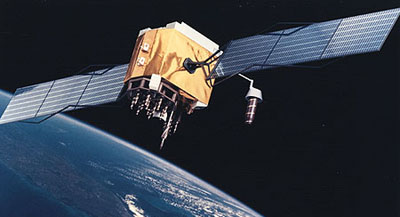Selling US space power shortby John B. Sheldon
|
| Instead of mentioning pumping gas and withdrawing money from ATMs, the national security space community should raise its sights higher to sell its space power message. |
Economics. Space power does more than pump gas or make sure that our courier packages get to where we need them on time. Space power ensures that the globalized economy in which we all live and work functions when we need it. It is this fast-moving globalized world, enabled by space power, that is motivating many countries around the world to purchase, and even build, their own satellites so that they can plug in to it. Space power ensures the efficient and safe functioning of most of the world’s major transportation networks in the air, at sea, and on the land. Space power enables the instantaneous and cheap global communication that we all take for granted, and is instrumental in the free flow of ideas and capital across the world. Central to space power’s role in our globalized economy is the Global Positioning System (GPS), operated by Air Force Space Command (AFSPC). GPS provides positioning, navigation, and timing data, and all three of these have become indispensable for a wide variety of commercial and civil applications, ranging from just-in-time logistics, international air and maritime traffic control, and the functioning of cellular telephone networks, to name but just a few. It should also be remembered that a globalized world economy enabled by US space power is not always peaceful. Order must be maintained, and, in the eventuality that disorder should move to Earth orbit, it will be the responsibility of the US national security space community to restore order and protect space systems through developing space situational awareness and defensive and offensive counterspace capabilities against the kinds of threats evidenced by China’s anti-satellite test in January this year.
Diplomatic. The role of the US national security space community and its space systems in America’s diplomacy is both immense and intricate. US space systems are the eyes and ears of our decision makers in Washington, DC, and our military commanders around the world. AFSPC-operated systems such as the Defense Support Program (DSP) ballistic missile early warning satellites, and its follow-on, the Space-Based Infra-Red System (SBIRS) satellites, are our frontline defense against the growing ballistic missile threat. Not only are they critical to US homeland security, they also magnify and enhance US diplomacy by providing reassurance to our allies around the world. AFSPC’s GPS satellites are the world standard for positioning, navigation, and timing, and are used and relied upon by all developed countries around the world. What is more, this global service is provided by the US to the world for free. Even competitors of GPS, such as the proposed European Galileo satellite navigation system, are based on technical standards established by GPS. Furthermore, the US national security space community allows our decision makers to monitor events around the world, and shape them, while at the same time allowing the US to keep a very low profile in sensitive situations. US national security space enables the United States to be the truly global power it is today, and enables us to wield our other instruments of national power with greater precision, timeliness, and effectiveness.
Military. Space power allows the United States and its allies to wage war appropriate to our political and ethical values. Space power is more than just enabling 24-hour, all-weather precision strike through GPS and actionable target intelligence from space-based reconnaissance; it’s about enabling our use of military force in accordance with our declared political and ethical values. It is about doing everything possible to ensure that innocent civilians are not killed, it is about our belief that the deliberate targeting of civilians is abhorrent to us, and that we will go beyond the last technological mile to ensure that their safety is a primary consideration, no matter how our enemies provoke us to do otherwise. Space power is also about ensuring that our soldiers, marines, airmen, and sailors are protected as much as possible from unnecessary danger, again thanks to GPS, allowing them all to do their already dangerous work without having to worry about friendly fire and being able to communicate instantaneously with headquarters and supporting forces, thanks to AFSPC military satellite communications. Space power is about protecting innocent civilians where possible, and allowing our forces to do their job. Yet our commitment to humanitarian values in the crucible of war, and now realized, albeit imperfectly, thanks to space power, should not blind us to the fact that space power is also about planning, coordinating, and delivering overwhelming firepower and dominant maneuver in the conventional battlespace, and about providing critical intelligence and command and control in the irregular battle. Space power keeps our footprint small and light, while allowing us to be agile and flexible, and making our air, land, and sea power more effective and lethal. Lastly, space power is about opening up more strategic and operational options for our civilian leadership and military commanders; it provides us with a decisive qualitative and quantitative edge over our adversaries.
Never mind pumping gas, US national security space plays a critical role in the running of the globalized economy—an economy led and championed by the United States; in promoting and enabling American diplomatic power; and provides the basis for American military might today. This stuff should be selling itself, but it seems that the public and the wider policy community are not hearing it. The US national security space community is filled with many of our brightest officers, including some notable strategic thinkers. Given this, why does the national security space community sell itself short in the public domain when it is providing such a critically important capability to America and the world?
